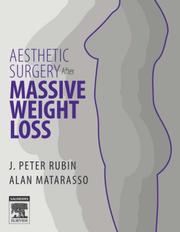| Listing 1 - 4 of 4 |
Sort by
|
Multi
ISBN: 9780128010037 0128010037 9780128007730 Year: 2015 Publisher: New York : Elsevier Science,
Abstract | Keywords | Export | Availability | Bookmark
 Loading...
Loading...Choose an application
- Reference Manager
- EndNote
- RefWorks (Direct export to RefWorks)
"Molecular Aspects of Alcohol and Nutrition is a valuable resource for nutrition researchers and nutritionists who study or treat alcohol-related diseases. Experts from across the field of alcohol research explain how alcohol disrupts normal fat, carbohydrate, and protein metabolic processes occurring in the liver as well as other parts of the body. The book discusses how this can lead to alcoholic liver disease (ALD) as well as contribute to the onset of Type 2 diabetes and the metabolic syndrome. It also explores how alcohol affects nutrient absorption in the gastrointestinal tract and can lead to anemia and reduced amounts of fat soluble vitamins. This book explores both the primary and secondary consequences of alcohol consumption. Chapters in the first section investigate the basic science of alcohol metabolism focusing on how alcohol and its toxic metabolites disrupt and impair normal nutrient regulation at the molecular level. Further chapters explore how alcohol affects many extra-hepatic organs and tissues as well as the secondary consequences of alcohol consumption such as reduced levels of minerals like magnesium, calcium, and trace elements like zinc."--
Ethanol --- Molecular Biology --- Alcoholism --- Nutrition Disorders --- Genetics --- Alcohol-Related Disorders --- Biochemistry --- Nutritional and Metabolic Diseases --- Alcohols --- Substance-Related Disorders --- Biology --- Biological Science Disciplines --- Chemistry --- Organic Chemicals --- Diseases --- Natural Science Disciplines --- Mental Disorders

ISBN: 9781845690540 1845690540 9781855739581 1855739585 9780849334405 0849334403 1280361808 9781280361807 9786610361809 9781845690840 Year: 2005 Publisher: Boca Raton, FL : Cambridge, England : CRC Press ; Woodhead Pub.,
Abstract | Keywords | Export | Availability | Bookmark
 Loading...
Loading...Choose an application
- Reference Manager
- EndNote
- RefWorks (Direct export to RefWorks)
Obesity is a global epidemic, with large proportions of adults and children overweight or obese in many developed and developing countries. As a result, there is an unprecedented level of interest and research in the complex interactions between our genetic susceptibility, diet and lifestyle in determining individual risk of obesity. With its distinguished editor and international team of contributors, this collection sums up the key themes in weight control research, focusing on their implications and applications for food product development and consumers.
Human medicine --- Obesity. --- Overweight --- Investigative Techniques --- Overnutrition --- Nutritional Physiological Phenomena --- Physiological Phenomena --- Body Weight --- Analytical, Diagnostic and Therapeutic Techniques and Equipment --- Nutrition Disorders --- Nutritional and Metabolic Diseases --- Body Size --- Signs and Symptoms --- Phenomena and Processes --- Pathological Conditions, Signs and Symptoms --- Body Weights and Measures --- Diseases --- Body Constitution --- Physical Examination --- Diagnostic Techniques and Procedures --- Diagnosis --- Diet --- Obesity --- Food habits --- Obesity in children. --- Weight loss. --- Physiological aspects. --- Nutritional aspects. --- Health aspects. --- Etiology. --- Psychological aspects. --- Prevention.

ISBN: 9781437710731 1437710735 9781416029526 1416029524 Year: 2007 Publisher: Philadelphia, PA Saunders Elsevier
Abstract | Keywords | Export | Availability | Bookmark
 Loading...
Loading...Choose an application
- Reference Manager
- EndNote
- RefWorks (Direct export to RefWorks)
Surgical Procedures, Operative --- Obesity --- Specialties, Surgical --- Body Weight Changes --- Overweight --- Body Weight --- Analytical, Diagnostic and Therapeutic Techniques and Equipment --- Medicine --- Overnutrition --- Signs and Symptoms --- Nutrition Disorders --- Health Occupations --- Body Size --- Growth --- Nutritional and Metabolic Diseases --- Disciplines and Occupations --- Pathological Conditions, Signs and Symptoms --- Growth and Development --- Diseases --- Body Weights and Measures --- Body Constitution --- Physiological Processes --- Physiological Phenomena --- Physical Examination --- Phenomena and Processes --- Diagnostic Techniques and Procedures --- Diagnosis --- Obesity, Morbid --- Surgery, Plastic --- Reconstructive Surgical Procedures --- Weight Loss

ISBN: 0521808782 0521004888 0511214154 0511215940 0511314930 0511817649 1280515813 0511210574 0511212348 1107713587 9780511210570 9780521808781 9780521004886 9780511212345 9780511214158 9780511215940 9780511817649 9786610515813 6610515816 9781107713581 9781280515811 9780511314933 Year: 2004 Volume: 38 Publisher: Cambridge Cambridge University press
Abstract | Keywords | Export | Availability | Bookmark
 Loading...
Loading...Choose an application
- Reference Manager
- EndNote
- RefWorks (Direct export to RefWorks)
Nobel laureate Robert Fogel's compelling study, first published in 2004, examines health, nutrition and technology over the last three centuries and beyond. Throughout most of human history, chronic malnutrition has been the norm. During the past three centuries, however, a synergy between improvements in productive technology and in human physiology has enabled humans to more than double their average longevity and to increase their average body size by over 50 per cent. Larger, healthier humans have contributed to the acceleration of economic growth and technological change, resulting in reduced economic inequality, declining hours of work and a corresponding increase in leisure time. Increased longevity has also brought increased demand for health care. Professor Fogel argues that health care should be viewed as the growth industry of the twenty-first century and systems of financing it should be reformed. His book will be essential reading for all those interested in economics, demography, history and health care policy.
Mortalité --- Mortalité --- 330.564 --- 338 <09> --- 364.22 --- 364.22 Armoede. Financiele problemen. Financiele nood --- Armoede. Financiele problemen. Financiele nood --- 338 <09> Economische geschiedenis --- Economische geschiedenis --- 330.564 Verdeling van nationaal inkomen. Inkomensverdeling --- Verdeling van nationaal inkomen. Inkomensverdeling --- Social problems --- World history --- anno 1700-1799 --- anno 1800-1999 --- anno 2000-2099 --- Food supply --- Malnutrition --- Medical care --- Mortality --- History. --- Arts and Humanities --- History --- Aliments --- Soins médicaux --- Approvisionnement --- Histoire --- Mortality, Law of --- Death --- Demography --- Death (Biology) --- Delivery of health care --- Delivery of medical care --- Health care --- Health care delivery --- Health services --- Healthcare --- Medical and health care industry --- Medical services --- Personal health services --- Public health --- Nutrition disorders --- Nutrition --- Starvation
| Listing 1 - 4 of 4 |
Sort by
|

 Search
Search Feedback
Feedback About UniCat
About UniCat  Help
Help News
News